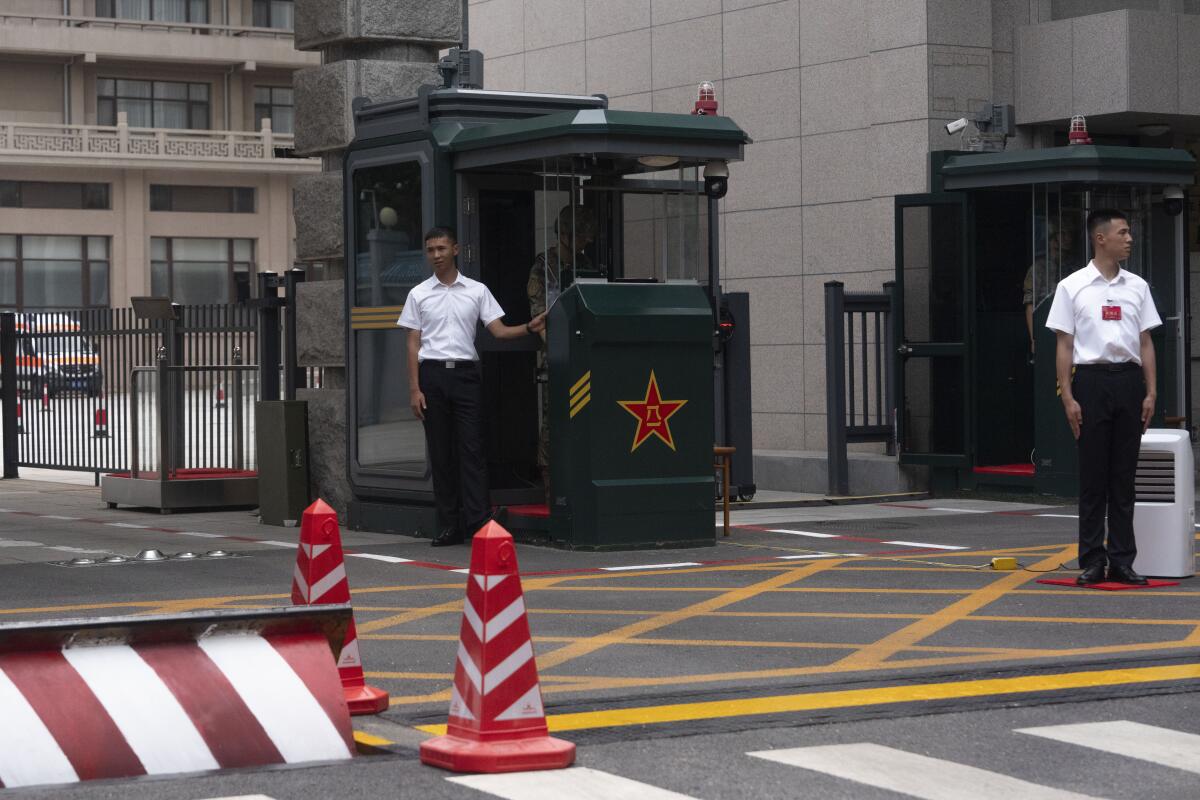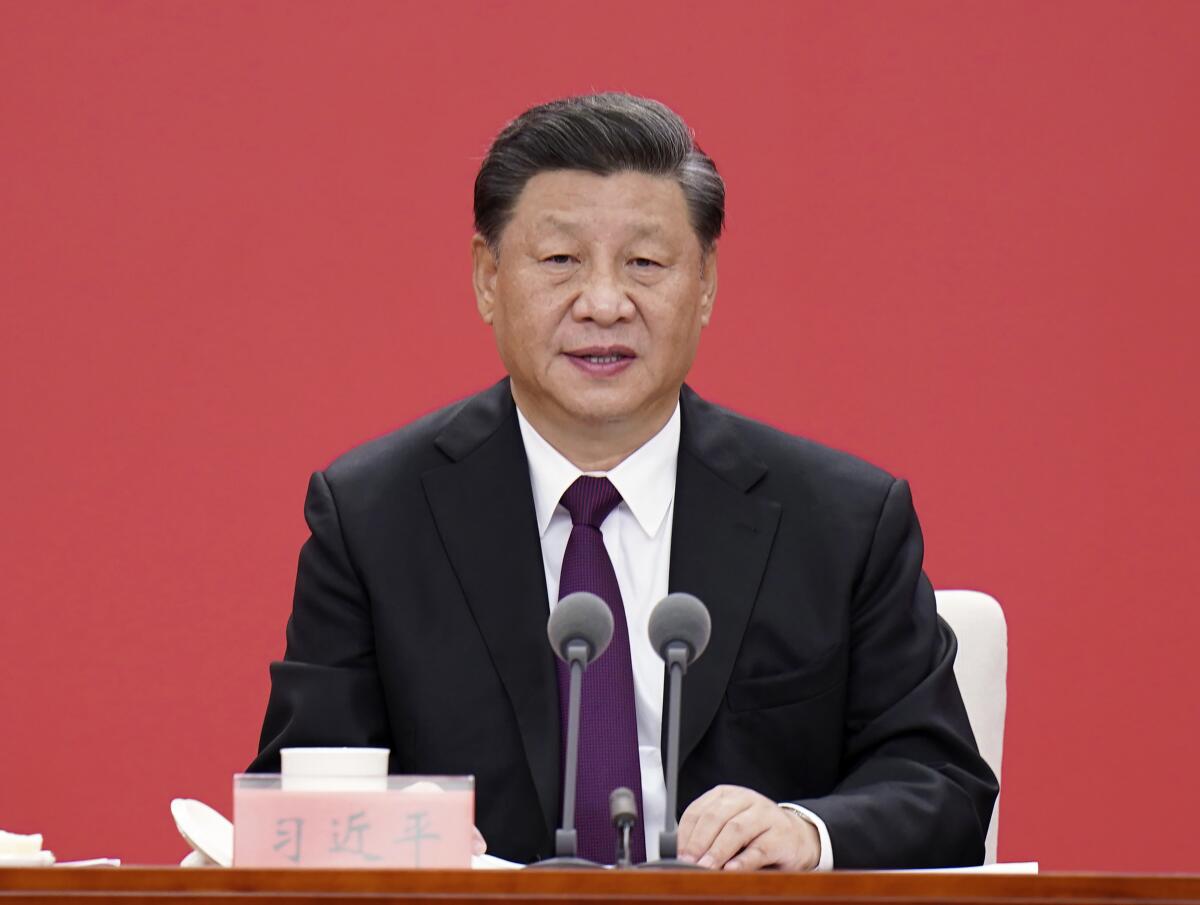In China, the message from the assassination attempt on former President Trump was clear: it was just another sign of the inevitable decline of its biggest rival.
The Global Times, a tabloid run by China’s Communist Party, said Saturday’s shooting in Pennsylvania was a sign of growing division and disorder in the country.
A cartoon in the publication titled “Democracy in Crisis” shows a wave of water engulfing the Statue of Liberty, captioned “Political Violence.”

Former President Trump (left) met with Chinese President Xi Jinping on the sidelines of the G20 summit in Osaka, Japan in 2019.
(Susan Walsh/The Associated Press)
“As the country becomes more polarized, such violence is likely to become more frequent,” the paper wrote. “The shooting has exposed a highly volatile and unpredictable side of U.S. politics and further raised doubts about Washington’s leadership among its allies.”
A gunman opened fire at a Trump rally on Saturday, killing one attendee and shooting the former president in the right ear. The gunman, whose motive remains under investigation, was shot and killed by a Secret Service agent.
Around the world, the attack was greeted with shock, horror and expressions of sympathy, but many of America’s enemies and rivals were quick to say it symbolized the decline and hypocrisy of American democracy and global leadership.
Chinese predictions of America’s decline are nothing new. In 1991, Wang Huning, a senior Communist Party official, published a book called “America vs. America,” in which he described his experiences in the US and the flaws of capitalism and democracy that were corroding the country’s future.
At the time, the United States was seen as the undisputed world leader in economic development and international diplomacy, while China was just beginning to get involved in world affairs. However, as China’s influence and economic power grew, so did tensions between the two countries.
Such stories of America’s demise have become more prevalent under President Xi Jinping, who has encouraged nationalism and tightened censorship of the internet and the media. The internal discord in the United States over the past few years has only strengthened China’s assertiveness.

Chinese security personnel stand guard at the entrance of the Jingxi Hotel, where the third plenary session of the Communist Party’s Central Committee is being held in Beijing on Monday. The Communist Party is expected to lay out a strategy for self-reliant economic growth at a time of growing national security concerns and limited access to U.S. technology.
(Ng Hung Guan/The Associated Press)
Throughout the pandemic, China has touted its ability to contain the spread of the virus as an example of its good governance, in contrast to the rapidly increasing number of cases in the U.S. Chinese critics also point to the Jan. 6 storming of the Capitol, Black Lives Matter protests, mass shootings and the weaknesses of this year’s two presidential candidates as further evidence of the flaws in Western democracies.
“These incidents, this political violence, fits with the view that the American political system is broken,” said Pradeep Taneja, a senior lecturer in Asian politics at the University of Melbourne. “A weaker America, a divided America, is good for China.”
China faces many domestic problems, including a stagnant economy, a declining birth rate and growing middle-class discontent. In recent years, the number of Chinese migrants arriving at the U.S. border after making dangerous journeys through Latin America in search of economic opportunity and political freedom has soared.
But the Global Times reported that Chinese people’s perceptions of the U.S. have grown more negative in recent years. A 2021 state media survey found that 8.1% of respondents thought China should “respect the West,” up from 37.2% five years earlier.
Opinion polls show that negative views of China are growing even more sharply in the United States.
Marie Prytherch, a research associate at the Contemporary China Center who conducted a 2022 survey of Chinese college students, said fewer young Chinese are seeing the U.S. as a more attractive option.
“Just because they were disillusioned with the Chinese system doesn’t mean they see the Western system as what they want,” she said.
Since taking office in 2013, Xi has positioned China as an alternative style of global leadership to Western hegemony, strengthened ties with U.S. adversaries such as Russia and North Korea, and worked to build friendly relations with Asia-Pacific countries through trade and diplomatic visits.

In this photo released by China’s Xinhua News Agency, President Xi Jinping speaks at an event in Shenzhen, southern China’s Guangdong province, in 2020. President Xi Jinping on Wednesday pledged new measures to support the development of Shenzhen, China’s biggest technology center, at a time when a feud with the United States has hampered access to American technology and raised ambitions to create Chinese providers.
(Zhang Ling/Associated Press)
Chinese officials have said little about the shooting. A Chinese foreign ministry spokesman said President Xi Jinping had expressed sympathy for Trump and was closely monitoring the situation. But the assassination attempt was widely discussed on Chinese social media, with even prominent academics spreading conspiracy theories about the gunman’s motives. Many agreed that the shooting was likely to boost Trump’s reelection chances.
Both President Trump and President Biden are trying to prove themselves as tough negotiators in the deteriorating U.S.-China relationship, which is unlikely to produce a beneficial outcome for China in November. Analysts said that while President Trump is more unpredictable than President Biden, his election could also weaken America’s alliances with other countries and give China an opportunity to strengthen its foothold in regions such as Asia and the Middle East.
“They’re pushing the idea that there are serious internal divisions within the United States that are really affecting its ability to lead on the world stage,” Prytherch said. “From the U.S. perspective, this is a historic moment. But to China, this is just another act of violence in the United States.”
Special correspondent Wu Xin-yun in Taipei contributed to this report.

